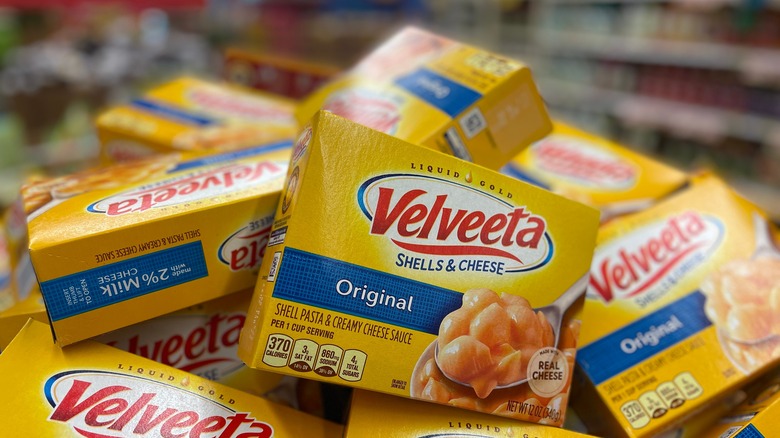Velveeta Is Being Sued Over Mac And Cheese Prep-Time Claims
Deliciously rich, macaroni and cheese is a quintessential comfort food. A part of the American culinary repertoire, Smithsonian Magazine shares that the dish became increasingly popular following the introduction of processed cheese products, which made preparing an ooey-gooey mac and cheese effortless and speedy. That said, although instant mac and cheese can be prepared within minutes, the exact time frame listed on Velveeta's Shells & Cheese cups is now the subject of a lawsuit following claims of inaccuracy.
According to The Washington Post, a Florida woman by the name of Amanda Ramirez has decided to legal action against the Kraft Heinz Foods Company, seeking $5 million in damages on behalf of fellow bamboozled customers. The reason? While the box states that Velveeta's Shells & Cheese Microwavable Macaroni and Cheese cups take 3 ½ minutes to prepare, that figure only accounts for cook time — not total prep time.
As per the instructions listed on the container, Kraft Heinz explains that the packaging must be removed from the single-serve pasta cup and the pouch of cheese sauce must be opened. Then, water is added to the pasta and stirred before being microwaved, and stirred again after adding in Velveeta cheese — plus, diners also have to wait for the sauce to thicken. All of these prep steps add up, leading to a proposed error (regardless of how minor it may appear) in just how long it actually takes to make the mac and cheese.
False claims can mislead shoppers
The charges against Kraft Heinz Co. include: "fraud, false and misleading advertising, breach of express warranty, negligent misrepresentation and unjust enrichment, along with violations of laws barring deceptive and unfair trade practices," shares The Washington Post. However, while the claims appear quite severe, the lawsuit does spark a dialogue about transparency, brand ethics, and how misleading marketing can have the potential to impact consumer choices based on claims made for convenience, and even the "premium costs" associated with a product.
That said, this isn't the first time a food brand has been sued over seemingly inaccurate claims. The New York Times shares that in 2020, there were 220 lawsuits (a record high) relating to false advertising in the foodscape, thanks to increased advocacy against deceptive marketing tactics used by food industry giants. Despite the fact that a number of cases are eventually dismissed, these lawsuits do act as a cautionary tale for companies to choose their words wisely.
As for what the Kraft Heinz Company had to say about the accusations, when asked for comment by Fox Business, a representative stated, "We are aware of this frivolous lawsuit and will strongly defend against the allegations in the complaint."

